Strategic Roles of HR Manager in Vodafone Group PLC
VerifiedAdded on 2023/01/16
|7
|1812
|67
Essay
AI Summary
This essay critically examines the strategic roles of a human resource (HR) manager within Vodafone Group PLC, a multinational telecommunications company. It explores key responsibilities such as recruitment, training, and employee motivation. The essay delves into the application of various models and theories, including Philips evaluation theory for training programs, Tuckman's theory for team building, Hofstede's cultural dimensions, and Fayol's principles of management. The analysis highlights how HR managers contribute to organizational success by effectively managing human capital, fostering a positive work environment, and aligning HR practices with the company's strategic objectives. The essay emphasizes the importance of these roles in a global context, considering cultural variations and the impact of HR practices on overall business performance. It concludes by summarizing the significance of HR managers in driving organizational success.
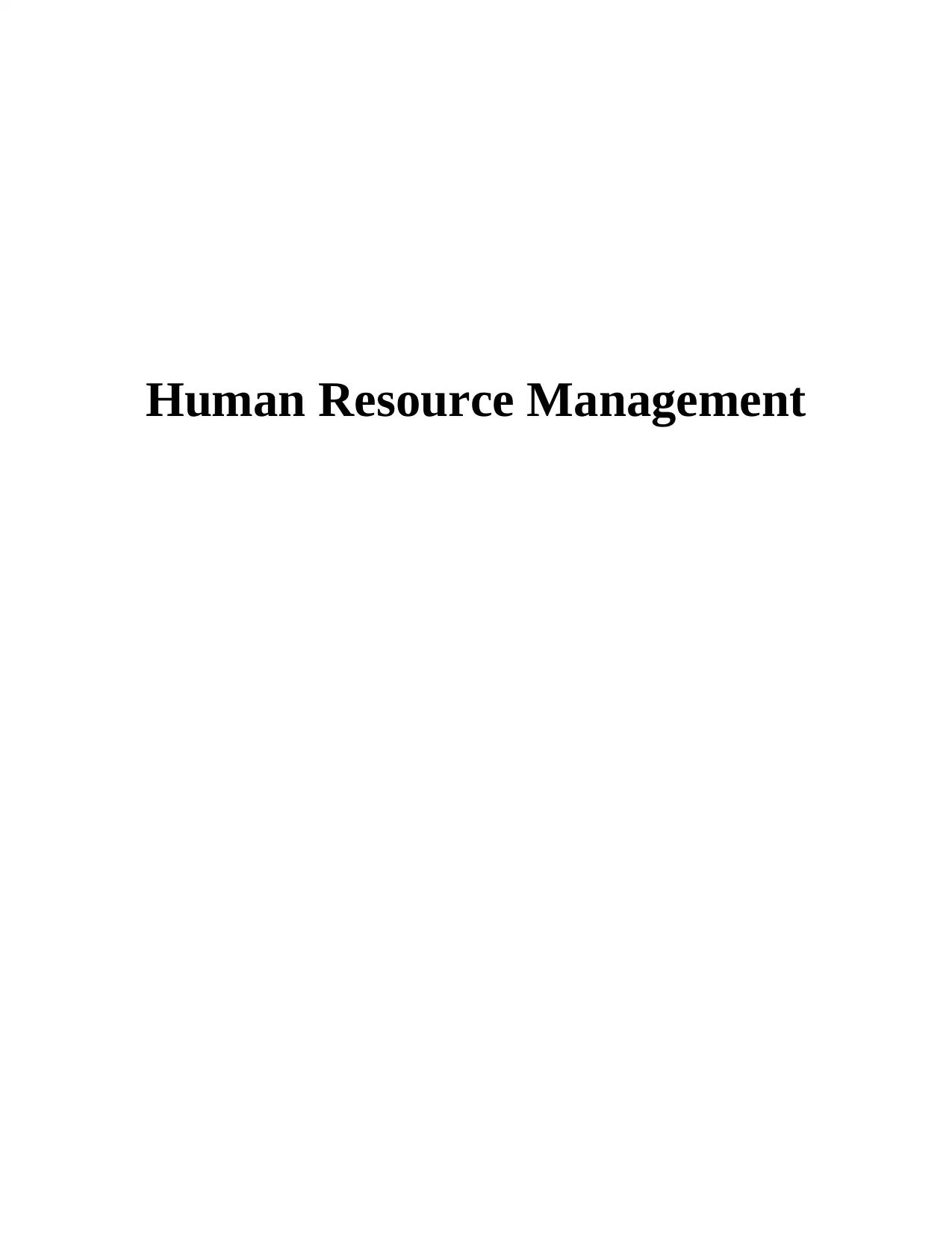
Human Resource Management
Paraphrase This Document
Need a fresh take? Get an instant paraphrase of this document with our AI Paraphraser
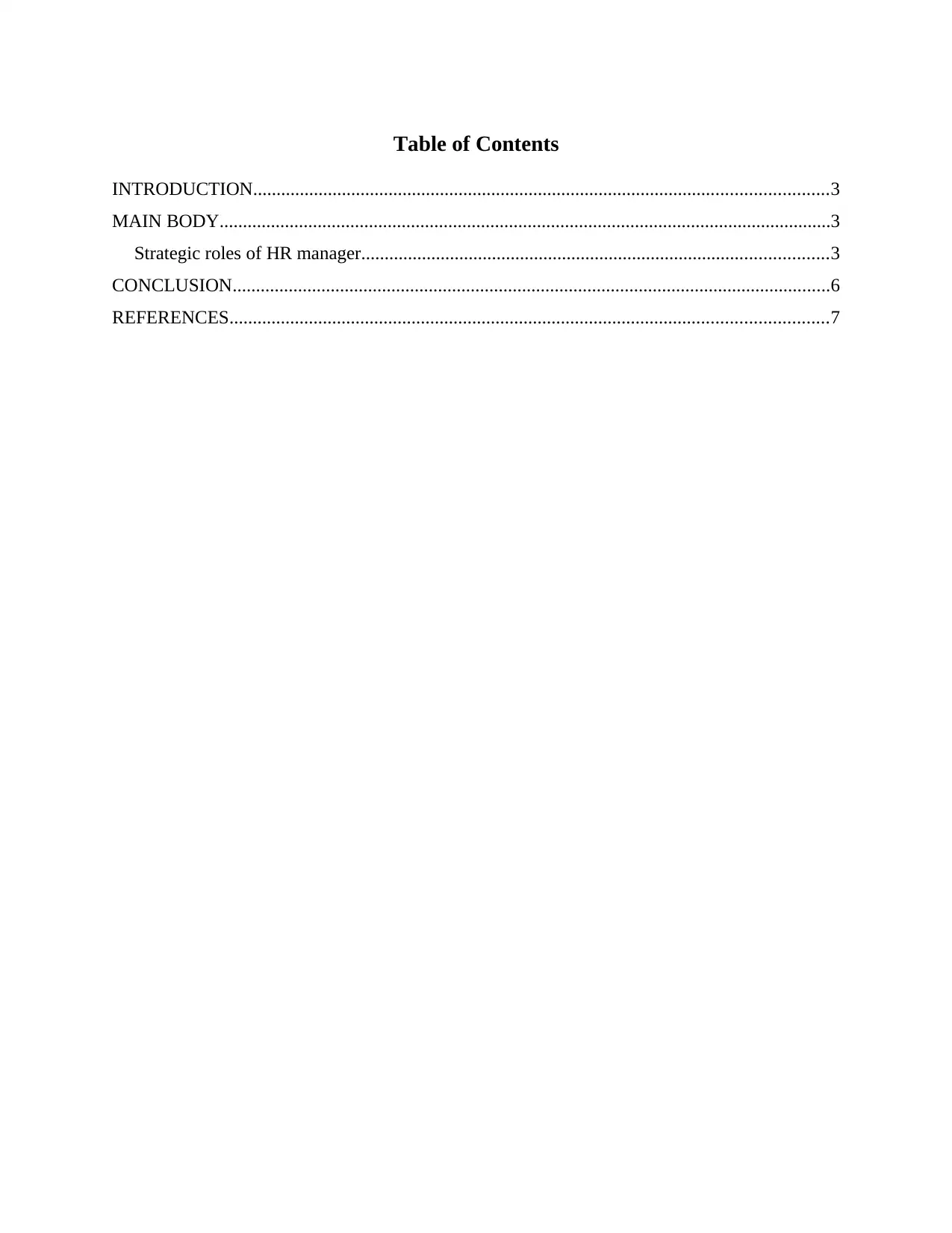
Table of Contents
INTRODUCTION...........................................................................................................................3
MAIN BODY...................................................................................................................................3
Strategic roles of HR manager....................................................................................................3
CONCLUSION................................................................................................................................6
REFERENCES................................................................................................................................7
INTRODUCTION...........................................................................................................................3
MAIN BODY...................................................................................................................................3
Strategic roles of HR manager....................................................................................................3
CONCLUSION................................................................................................................................6
REFERENCES................................................................................................................................7
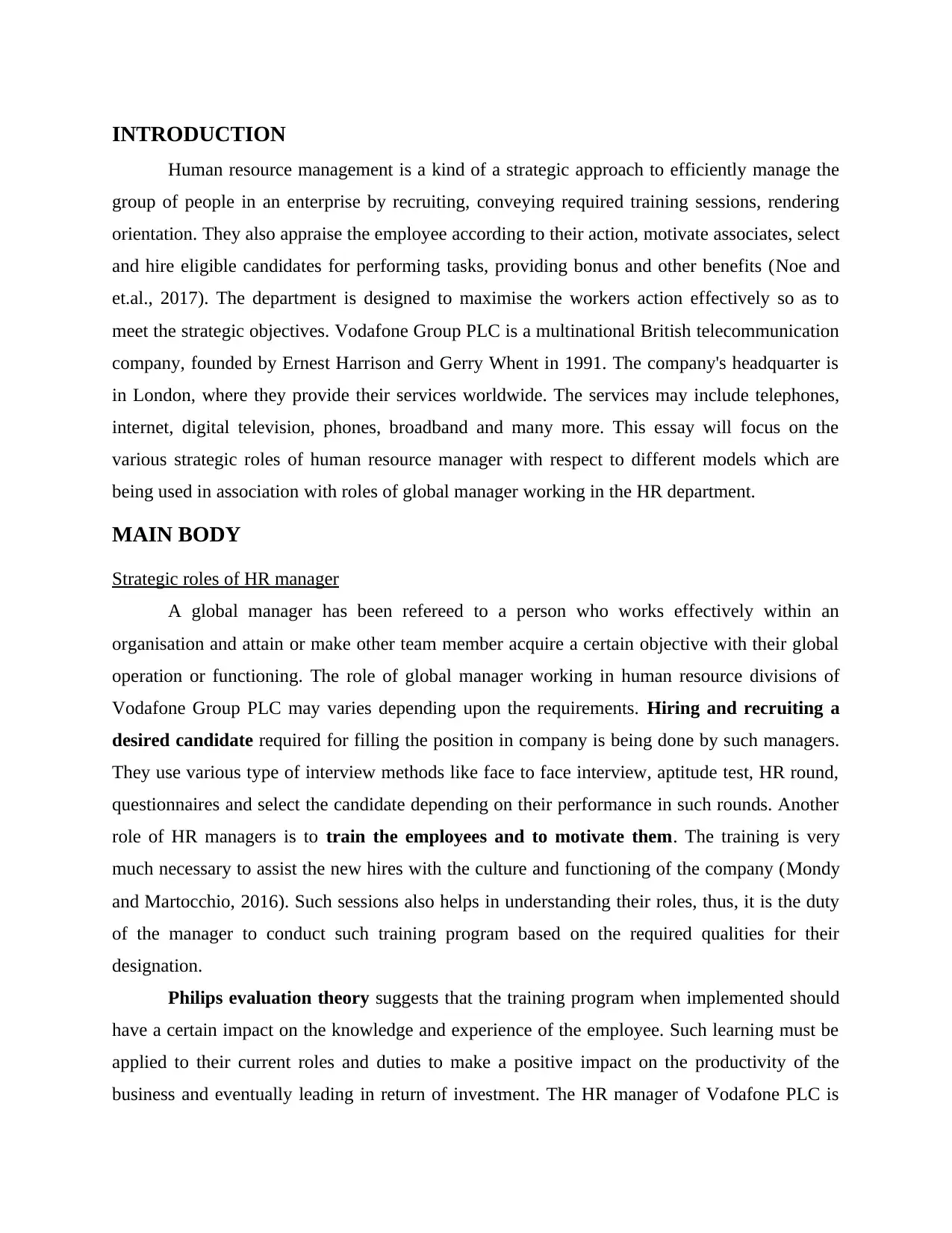
INTRODUCTION
Human resource management is a kind of a strategic approach to efficiently manage the
group of people in an enterprise by recruiting, conveying required training sessions, rendering
orientation. They also appraise the employee according to their action, motivate associates, select
and hire eligible candidates for performing tasks, providing bonus and other benefits (Noe and
et.al., 2017). The department is designed to maximise the workers action effectively so as to
meet the strategic objectives. Vodafone Group PLC is a multinational British telecommunication
company, founded by Ernest Harrison and Gerry Whent in 1991. The company's headquarter is
in London, where they provide their services worldwide. The services may include telephones,
internet, digital television, phones, broadband and many more. This essay will focus on the
various strategic roles of human resource manager with respect to different models which are
being used in association with roles of global manager working in the HR department.
MAIN BODY
Strategic roles of HR manager
A global manager has been refereed to a person who works effectively within an
organisation and attain or make other team member acquire a certain objective with their global
operation or functioning. The role of global manager working in human resource divisions of
Vodafone Group PLC may varies depending upon the requirements. Hiring and recruiting a
desired candidate required for filling the position in company is being done by such managers.
They use various type of interview methods like face to face interview, aptitude test, HR round,
questionnaires and select the candidate depending on their performance in such rounds. Another
role of HR managers is to train the employees and to motivate them. The training is very
much necessary to assist the new hires with the culture and functioning of the company (Mondy
and Martocchio, 2016). Such sessions also helps in understanding their roles, thus, it is the duty
of the manager to conduct such training program based on the required qualities for their
designation.
Philips evaluation theory suggests that the training program when implemented should
have a certain impact on the knowledge and experience of the employee. Such learning must be
applied to their current roles and duties to make a positive impact on the productivity of the
business and eventually leading in return of investment. The HR manager of Vodafone PLC is
Human resource management is a kind of a strategic approach to efficiently manage the
group of people in an enterprise by recruiting, conveying required training sessions, rendering
orientation. They also appraise the employee according to their action, motivate associates, select
and hire eligible candidates for performing tasks, providing bonus and other benefits (Noe and
et.al., 2017). The department is designed to maximise the workers action effectively so as to
meet the strategic objectives. Vodafone Group PLC is a multinational British telecommunication
company, founded by Ernest Harrison and Gerry Whent in 1991. The company's headquarter is
in London, where they provide their services worldwide. The services may include telephones,
internet, digital television, phones, broadband and many more. This essay will focus on the
various strategic roles of human resource manager with respect to different models which are
being used in association with roles of global manager working in the HR department.
MAIN BODY
Strategic roles of HR manager
A global manager has been refereed to a person who works effectively within an
organisation and attain or make other team member acquire a certain objective with their global
operation or functioning. The role of global manager working in human resource divisions of
Vodafone Group PLC may varies depending upon the requirements. Hiring and recruiting a
desired candidate required for filling the position in company is being done by such managers.
They use various type of interview methods like face to face interview, aptitude test, HR round,
questionnaires and select the candidate depending on their performance in such rounds. Another
role of HR managers is to train the employees and to motivate them. The training is very
much necessary to assist the new hires with the culture and functioning of the company (Mondy
and Martocchio, 2016). Such sessions also helps in understanding their roles, thus, it is the duty
of the manager to conduct such training program based on the required qualities for their
designation.
Philips evaluation theory suggests that the training program when implemented should
have a certain impact on the knowledge and experience of the employee. Such learning must be
applied to their current roles and duties to make a positive impact on the productivity of the
business and eventually leading in return of investment. The HR manager of Vodafone PLC is
⊘ This is a preview!⊘
Do you want full access?
Subscribe today to unlock all pages.

Trusted by 1+ million students worldwide
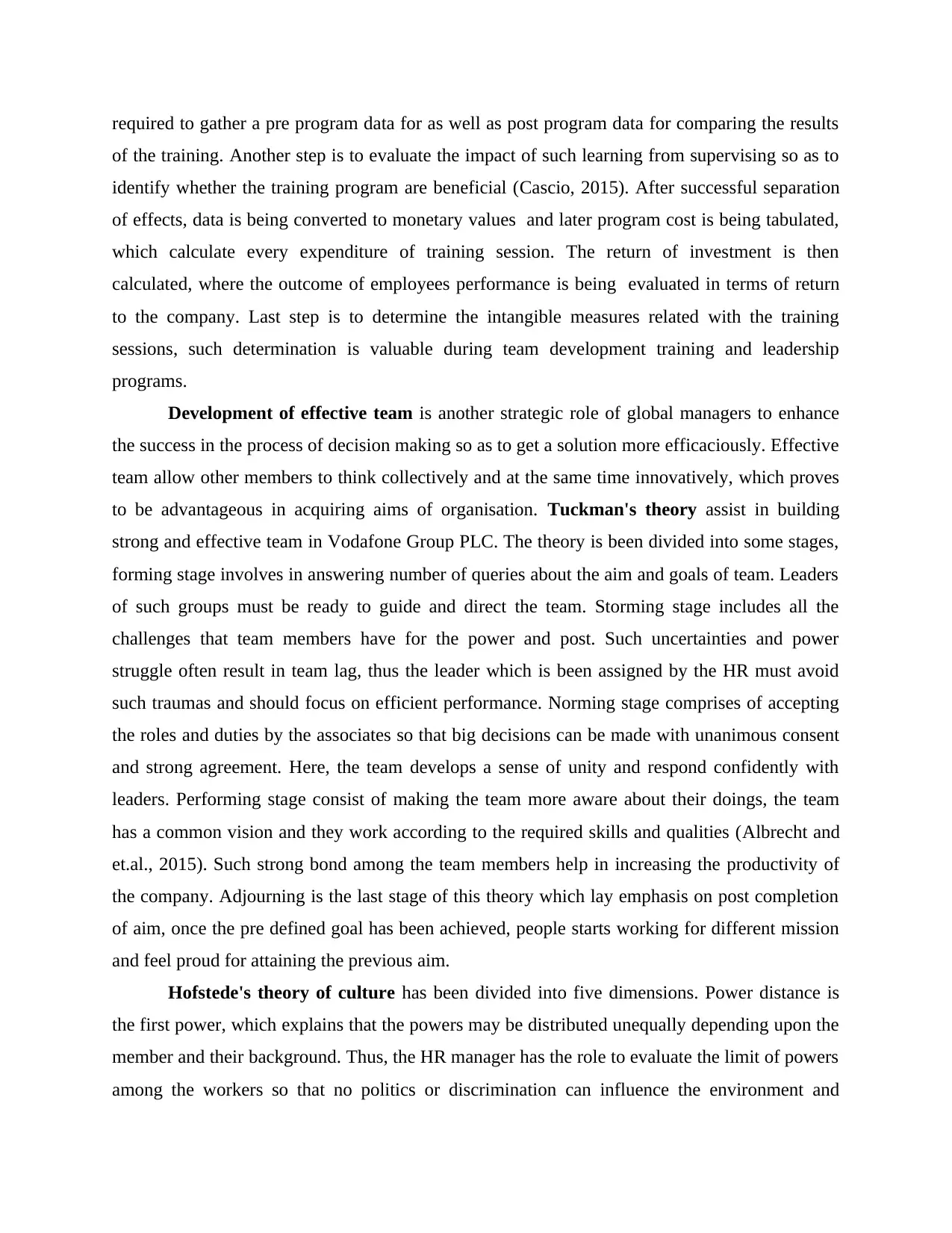
required to gather a pre program data for as well as post program data for comparing the results
of the training. Another step is to evaluate the impact of such learning from supervising so as to
identify whether the training program are beneficial (Cascio, 2015). After successful separation
of effects, data is being converted to monetary values and later program cost is being tabulated,
which calculate every expenditure of training session. The return of investment is then
calculated, where the outcome of employees performance is being evaluated in terms of return
to the company. Last step is to determine the intangible measures related with the training
sessions, such determination is valuable during team development training and leadership
programs.
Development of effective team is another strategic role of global managers to enhance
the success in the process of decision making so as to get a solution more efficaciously. Effective
team allow other members to think collectively and at the same time innovatively, which proves
to be advantageous in acquiring aims of organisation. Tuckman's theory assist in building
strong and effective team in Vodafone Group PLC. The theory is been divided into some stages,
forming stage involves in answering number of queries about the aim and goals of team. Leaders
of such groups must be ready to guide and direct the team. Storming stage includes all the
challenges that team members have for the power and post. Such uncertainties and power
struggle often result in team lag, thus the leader which is been assigned by the HR must avoid
such traumas and should focus on efficient performance. Norming stage comprises of accepting
the roles and duties by the associates so that big decisions can be made with unanimous consent
and strong agreement. Here, the team develops a sense of unity and respond confidently with
leaders. Performing stage consist of making the team more aware about their doings, the team
has a common vision and they work according to the required skills and qualities (Albrecht and
et.al., 2015). Such strong bond among the team members help in increasing the productivity of
the company. Adjourning is the last stage of this theory which lay emphasis on post completion
of aim, once the pre defined goal has been achieved, people starts working for different mission
and feel proud for attaining the previous aim.
Hofstede's theory of culture has been divided into five dimensions. Power distance is
the first power, which explains that the powers may be distributed unequally depending upon the
member and their background. Thus, the HR manager has the role to evaluate the limit of powers
among the workers so that no politics or discrimination can influence the environment and
of the training. Another step is to evaluate the impact of such learning from supervising so as to
identify whether the training program are beneficial (Cascio, 2015). After successful separation
of effects, data is being converted to monetary values and later program cost is being tabulated,
which calculate every expenditure of training session. The return of investment is then
calculated, where the outcome of employees performance is being evaluated in terms of return
to the company. Last step is to determine the intangible measures related with the training
sessions, such determination is valuable during team development training and leadership
programs.
Development of effective team is another strategic role of global managers to enhance
the success in the process of decision making so as to get a solution more efficaciously. Effective
team allow other members to think collectively and at the same time innovatively, which proves
to be advantageous in acquiring aims of organisation. Tuckman's theory assist in building
strong and effective team in Vodafone Group PLC. The theory is been divided into some stages,
forming stage involves in answering number of queries about the aim and goals of team. Leaders
of such groups must be ready to guide and direct the team. Storming stage includes all the
challenges that team members have for the power and post. Such uncertainties and power
struggle often result in team lag, thus the leader which is been assigned by the HR must avoid
such traumas and should focus on efficient performance. Norming stage comprises of accepting
the roles and duties by the associates so that big decisions can be made with unanimous consent
and strong agreement. Here, the team develops a sense of unity and respond confidently with
leaders. Performing stage consist of making the team more aware about their doings, the team
has a common vision and they work according to the required skills and qualities (Albrecht and
et.al., 2015). Such strong bond among the team members help in increasing the productivity of
the company. Adjourning is the last stage of this theory which lay emphasis on post completion
of aim, once the pre defined goal has been achieved, people starts working for different mission
and feel proud for attaining the previous aim.
Hofstede's theory of culture has been divided into five dimensions. Power distance is
the first power, which explains that the powers may be distributed unequally depending upon the
member and their background. Thus, the HR manager has the role to evaluate the limit of powers
among the workers so that no politics or discrimination can influence the environment and
Paraphrase This Document
Need a fresh take? Get an instant paraphrase of this document with our AI Paraphraser
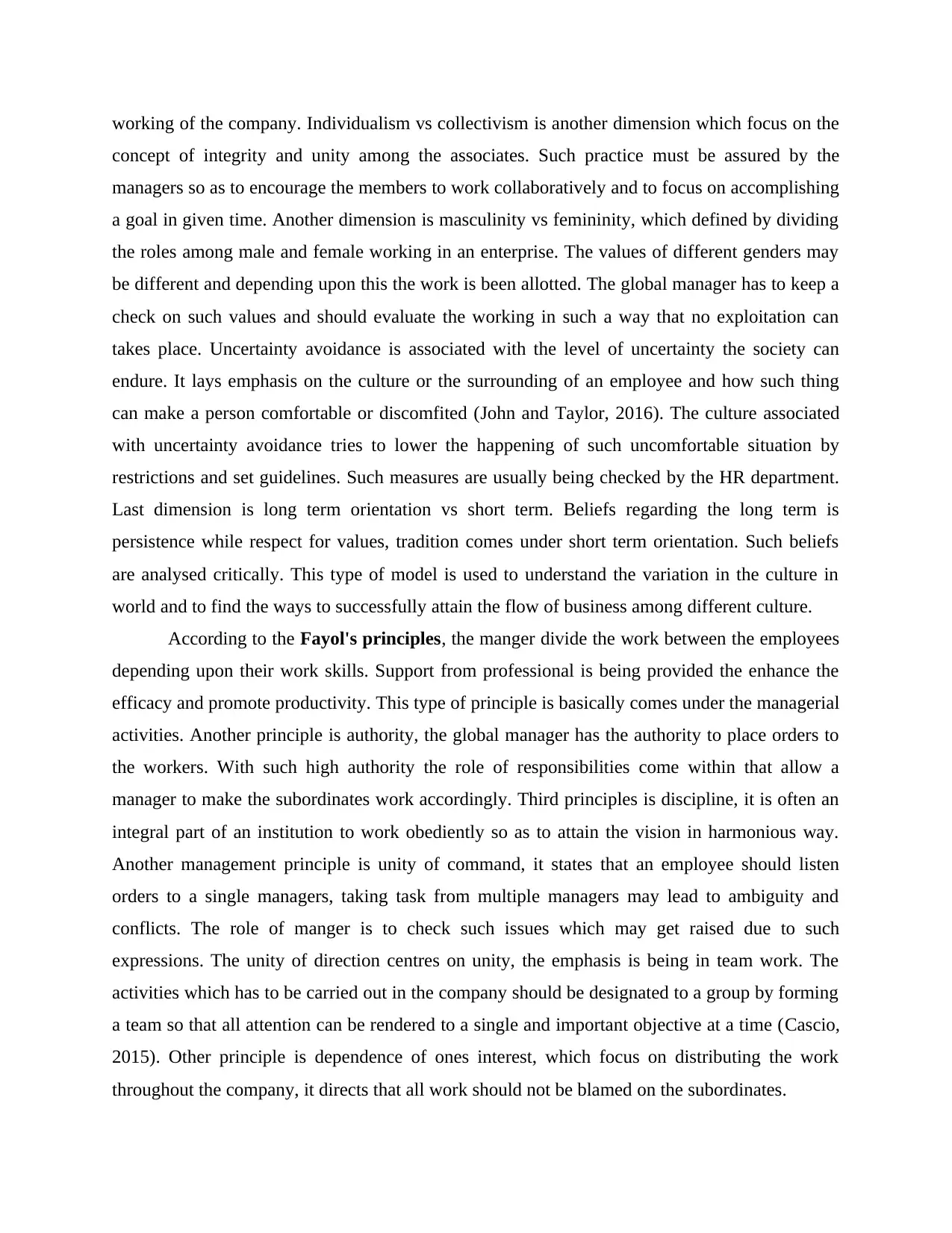
working of the company. Individualism vs collectivism is another dimension which focus on the
concept of integrity and unity among the associates. Such practice must be assured by the
managers so as to encourage the members to work collaboratively and to focus on accomplishing
a goal in given time. Another dimension is masculinity vs femininity, which defined by dividing
the roles among male and female working in an enterprise. The values of different genders may
be different and depending upon this the work is been allotted. The global manager has to keep a
check on such values and should evaluate the working in such a way that no exploitation can
takes place. Uncertainty avoidance is associated with the level of uncertainty the society can
endure. It lays emphasis on the culture or the surrounding of an employee and how such thing
can make a person comfortable or discomfited (John and Taylor, 2016). The culture associated
with uncertainty avoidance tries to lower the happening of such uncomfortable situation by
restrictions and set guidelines. Such measures are usually being checked by the HR department.
Last dimension is long term orientation vs short term. Beliefs regarding the long term is
persistence while respect for values, tradition comes under short term orientation. Such beliefs
are analysed critically. This type of model is used to understand the variation in the culture in
world and to find the ways to successfully attain the flow of business among different culture.
According to the Fayol's principles, the manger divide the work between the employees
depending upon their work skills. Support from professional is being provided the enhance the
efficacy and promote productivity. This type of principle is basically comes under the managerial
activities. Another principle is authority, the global manager has the authority to place orders to
the workers. With such high authority the role of responsibilities come within that allow a
manager to make the subordinates work accordingly. Third principles is discipline, it is often an
integral part of an institution to work obediently so as to attain the vision in harmonious way.
Another management principle is unity of command, it states that an employee should listen
orders to a single managers, taking task from multiple managers may lead to ambiguity and
conflicts. The role of manger is to check such issues which may get raised due to such
expressions. The unity of direction centres on unity, the emphasis is being in team work. The
activities which has to be carried out in the company should be designated to a group by forming
a team so that all attention can be rendered to a single and important objective at a time (Cascio,
2015). Other principle is dependence of ones interest, which focus on distributing the work
throughout the company, it directs that all work should not be blamed on the subordinates.
concept of integrity and unity among the associates. Such practice must be assured by the
managers so as to encourage the members to work collaboratively and to focus on accomplishing
a goal in given time. Another dimension is masculinity vs femininity, which defined by dividing
the roles among male and female working in an enterprise. The values of different genders may
be different and depending upon this the work is been allotted. The global manager has to keep a
check on such values and should evaluate the working in such a way that no exploitation can
takes place. Uncertainty avoidance is associated with the level of uncertainty the society can
endure. It lays emphasis on the culture or the surrounding of an employee and how such thing
can make a person comfortable or discomfited (John and Taylor, 2016). The culture associated
with uncertainty avoidance tries to lower the happening of such uncomfortable situation by
restrictions and set guidelines. Such measures are usually being checked by the HR department.
Last dimension is long term orientation vs short term. Beliefs regarding the long term is
persistence while respect for values, tradition comes under short term orientation. Such beliefs
are analysed critically. This type of model is used to understand the variation in the culture in
world and to find the ways to successfully attain the flow of business among different culture.
According to the Fayol's principles, the manger divide the work between the employees
depending upon their work skills. Support from professional is being provided the enhance the
efficacy and promote productivity. This type of principle is basically comes under the managerial
activities. Another principle is authority, the global manager has the authority to place orders to
the workers. With such high authority the role of responsibilities come within that allow a
manager to make the subordinates work accordingly. Third principles is discipline, it is often an
integral part of an institution to work obediently so as to attain the vision in harmonious way.
Another management principle is unity of command, it states that an employee should listen
orders to a single managers, taking task from multiple managers may lead to ambiguity and
conflicts. The role of manger is to check such issues which may get raised due to such
expressions. The unity of direction centres on unity, the emphasis is being in team work. The
activities which has to be carried out in the company should be designated to a group by forming
a team so that all attention can be rendered to a single and important objective at a time (Cascio,
2015). Other principle is dependence of ones interest, which focus on distributing the work
throughout the company, it directs that all work should not be blamed on the subordinates.
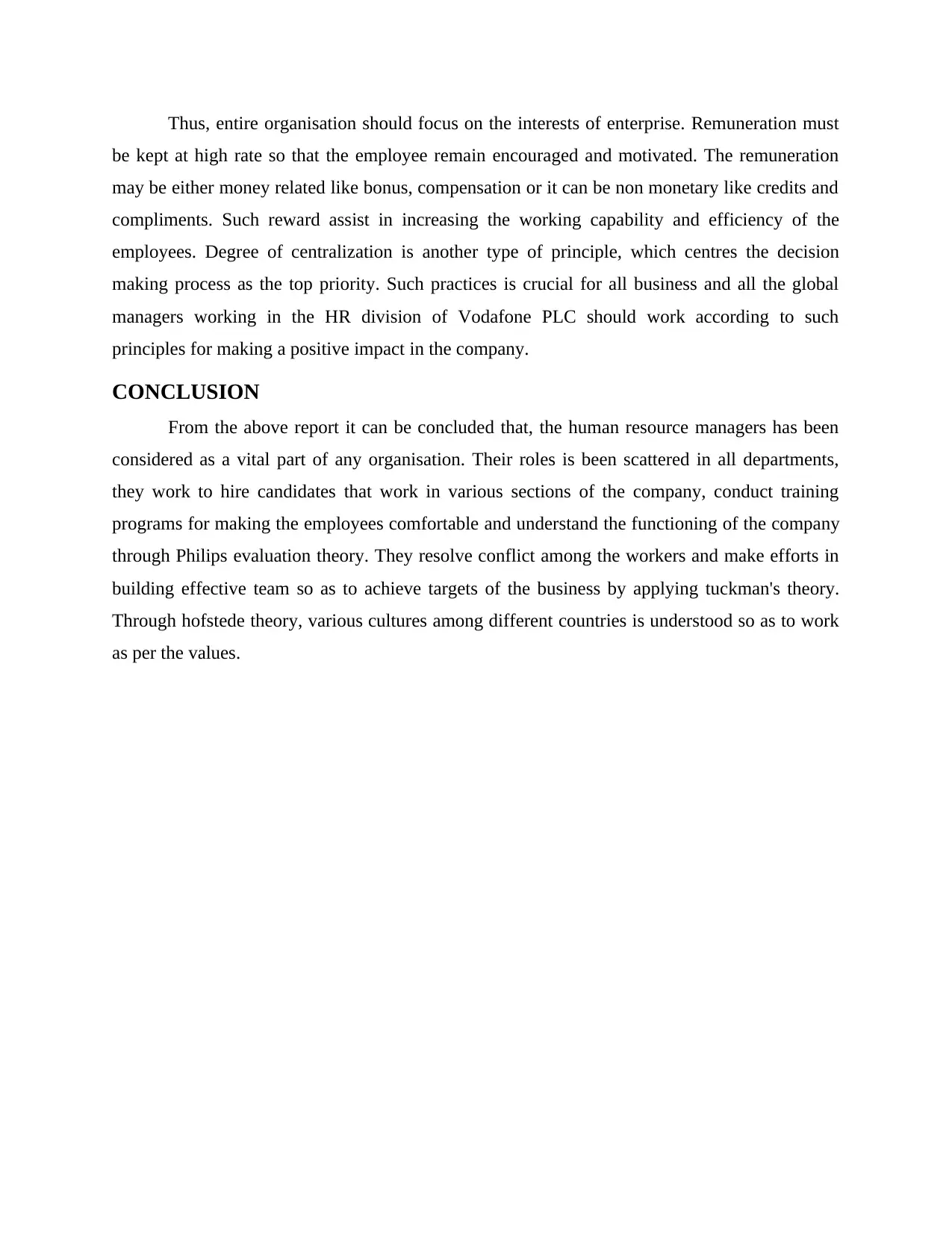
Thus, entire organisation should focus on the interests of enterprise. Remuneration must
be kept at high rate so that the employee remain encouraged and motivated. The remuneration
may be either money related like bonus, compensation or it can be non monetary like credits and
compliments. Such reward assist in increasing the working capability and efficiency of the
employees. Degree of centralization is another type of principle, which centres the decision
making process as the top priority. Such practices is crucial for all business and all the global
managers working in the HR division of Vodafone PLC should work according to such
principles for making a positive impact in the company.
CONCLUSION
From the above report it can be concluded that, the human resource managers has been
considered as a vital part of any organisation. Their roles is been scattered in all departments,
they work to hire candidates that work in various sections of the company, conduct training
programs for making the employees comfortable and understand the functioning of the company
through Philips evaluation theory. They resolve conflict among the workers and make efforts in
building effective team so as to achieve targets of the business by applying tuckman's theory.
Through hofstede theory, various cultures among different countries is understood so as to work
as per the values.
be kept at high rate so that the employee remain encouraged and motivated. The remuneration
may be either money related like bonus, compensation or it can be non monetary like credits and
compliments. Such reward assist in increasing the working capability and efficiency of the
employees. Degree of centralization is another type of principle, which centres the decision
making process as the top priority. Such practices is crucial for all business and all the global
managers working in the HR division of Vodafone PLC should work according to such
principles for making a positive impact in the company.
CONCLUSION
From the above report it can be concluded that, the human resource managers has been
considered as a vital part of any organisation. Their roles is been scattered in all departments,
they work to hire candidates that work in various sections of the company, conduct training
programs for making the employees comfortable and understand the functioning of the company
through Philips evaluation theory. They resolve conflict among the workers and make efforts in
building effective team so as to achieve targets of the business by applying tuckman's theory.
Through hofstede theory, various cultures among different countries is understood so as to work
as per the values.
⊘ This is a preview!⊘
Do you want full access?
Subscribe today to unlock all pages.

Trusted by 1+ million students worldwide
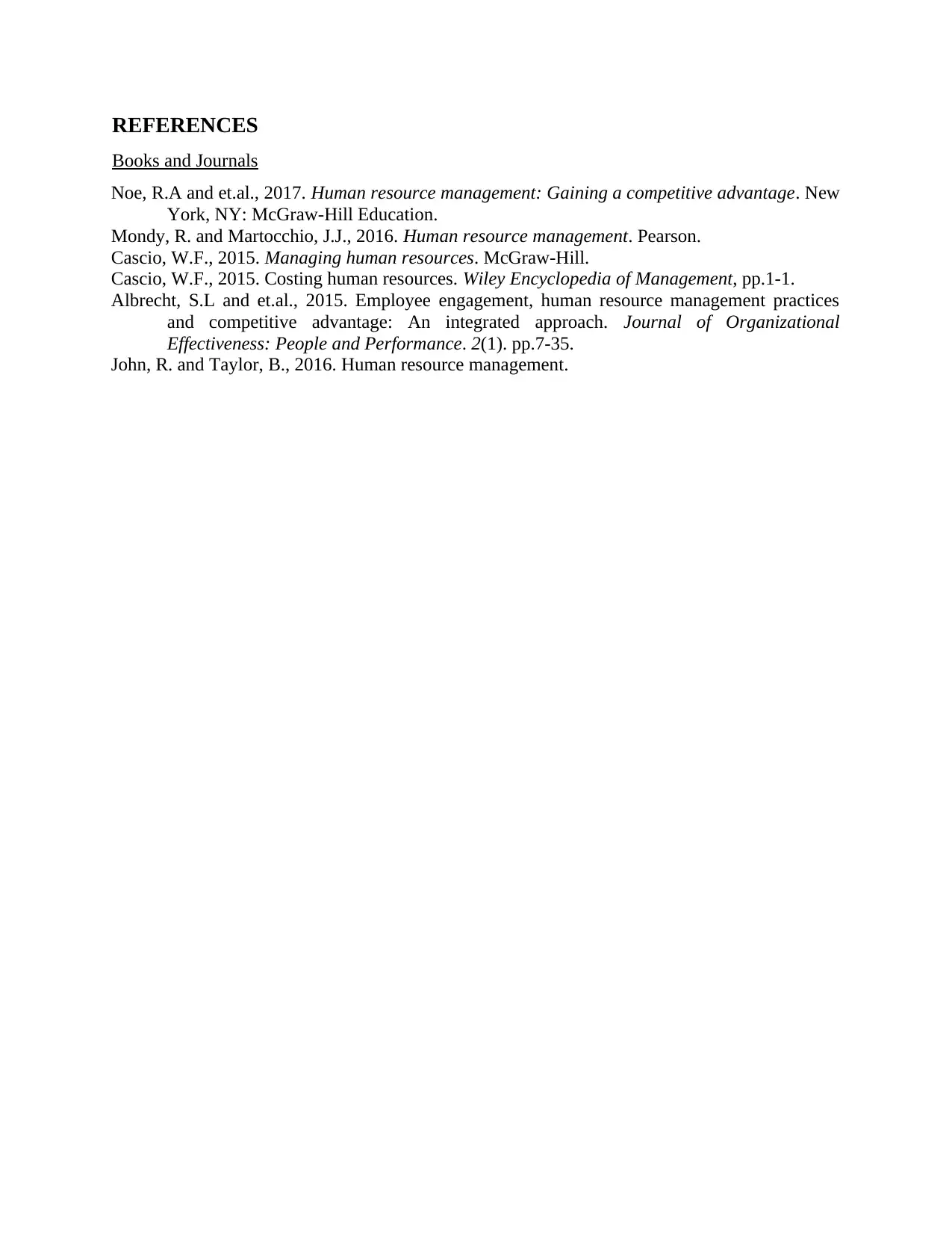
REFERENCES
Books and Journals
Noe, R.A and et.al., 2017. Human resource management: Gaining a competitive advantage. New
York, NY: McGraw-Hill Education.
Mondy, R. and Martocchio, J.J., 2016. Human resource management. Pearson.
Cascio, W.F., 2015. Managing human resources. McGraw-Hill.
Cascio, W.F., 2015. Costing human resources. Wiley Encyclopedia of Management, pp.1-1.
Albrecht, S.L and et.al., 2015. Employee engagement, human resource management practices
and competitive advantage: An integrated approach. Journal of Organizational
Effectiveness: People and Performance. 2(1). pp.7-35.
John, R. and Taylor, B., 2016. Human resource management.
Books and Journals
Noe, R.A and et.al., 2017. Human resource management: Gaining a competitive advantage. New
York, NY: McGraw-Hill Education.
Mondy, R. and Martocchio, J.J., 2016. Human resource management. Pearson.
Cascio, W.F., 2015. Managing human resources. McGraw-Hill.
Cascio, W.F., 2015. Costing human resources. Wiley Encyclopedia of Management, pp.1-1.
Albrecht, S.L and et.al., 2015. Employee engagement, human resource management practices
and competitive advantage: An integrated approach. Journal of Organizational
Effectiveness: People and Performance. 2(1). pp.7-35.
John, R. and Taylor, B., 2016. Human resource management.
1 out of 7
Related Documents
Your All-in-One AI-Powered Toolkit for Academic Success.
+13062052269
info@desklib.com
Available 24*7 on WhatsApp / Email
![[object Object]](/_next/static/media/star-bottom.7253800d.svg)
Unlock your academic potential
Copyright © 2020–2026 A2Z Services. All Rights Reserved. Developed and managed by ZUCOL.




